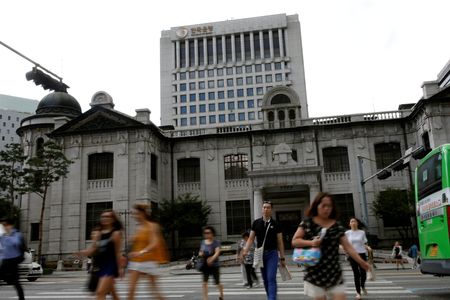 1
1 1
1
By Jihoon Lee and Joyce Lee
SEOUL (Reuters) -South Korea’s central bank held interest rates steady for a fourth straight meeting on Thursday, saying it will maintain a tight stance on monetary policy amid still high prices despite heightened financial uncertainty.
The Bank of Korea (BOK) said its seven-member monetary policy board voted to keep the base rate unchanged at 3.50%, as it did in meetings in February, April and May.
The decision was in line with the unanimous forecasts of 46 economists surveyed by Reuters.
At the meeting on Thursday, six of the board members kept the door open for further rate hikes and there was no discussion about cutting rates, said Governor Rhee Chang-yong, who did not reveal his own view.
“It is too early to be relieved by recent stabilisation in foreign exchange rates, and that was the biggest reason behind their opinions,” Rhee said during a news conference, citing uncertainty regarding monetary policy in the United States.
The won has strengthened 5.5% against the dollar since mid-May, when it hit a six-month low, as the Federal Reserve last month paused after a run of 10 straight rate increases.
South Korea’s heavily trade-reliant economy has been losing momentum this year due to a slowing global economy, weak chip sector and still sluggish demand from China, although consumer sentiment ticked up in June to its highest in just over a year.
The central bank said in a statement that core inflation for the year was seen slightly higher than its previous projection, while risks to some non-bank financial sectors have expanded.
The situation at MG Community Credit Cooperatives, a non-bank financial institution recently hit by customer withdrawals, however, has been stabilising and remains manageable, Rhee said, adding that the authorities would respond to such events with micro-means rather than macro-policies.
The BOK has kept monetary policy unchanged since its last interest rate hike in January and its tightening campaign, which began in August 2021, was widely expected to be over.
“The meeting confirmed that the central bank was in a tough position, finding both a hike and cut difficult,” said Ahn Jae-kyun, fixed-income analyst at Shinhan Securities.
“It will start to consider economic growth from the first half of next year, after inflation rates come down,” he said, retaining his view of no change for the rest of the year.
The government and central bank have forecast growth of 1.4% this year, down from 2.6% in 2022.
Annual consumer inflation has eased since peaking at a 24-year high of 6.3% in July 2022. The rate stood at 2.7% in June this year, although it is still higher than the central bank’s medium-term target of 2%.
(Reporting by Jihoon Lee and Joyce Lee; Additional Reporting by Yena Park and Youn Ah Moon; Editing by Jacqueline Wong)